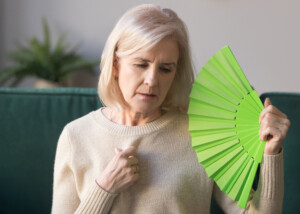Feeling too hot to sleep can be caused by cancer, but there’s no need to panic.
Being so hot at night that sleep is troublesome has an assortment of potential causes.
Do you do rigorous exercise close to bedtime or even a few hours preceding bedtime?
If the exercise was intense enough, it “revs up the metabolism and a faster metabolism means a hotter body,” says Kathryn Boling, MD, a board certified family medicine practitioner with Mercy Medical Center in Baltimore, MD.
Hot Flashes Can Make You too Hot to Sleep
“Drinking alcohol can cause hot flashes at night,” says Dr. Boling. Cut back on the booze.
“Hormonal changes like menstruation, ovulation and menopause can cause hot flashes at night.”
You may be going through menopause and not know it. Even periomenopause and pregnancy can cause hot flashes.
So can low blood sugar, even though you may not feel other classic symptoms of this, such as jitteriness and extreme hunger.
Can cancer make you feel hot at night?
Unfortunately, yes—a type of cancer called lymphoma, says Dr. Boling.
But if this cancer is already causing your body to be hot and sweaty, chances are pretty high that it’s causing other symptoms as well.
In other words, it’s unlikely you’re feeling as healthy as a thoroughbred while lymphoma is causing you soaking night sweats—and yes, the lymphoma night sweat is more than just perspiration; it’s enough to soak your clothes, even bedsheets.
Other symptoms of this cancer: unintentional weight loss, unexplained fatigue, fever, abdominal itching, stomach pain, unexplained cough, shortness of breath, swollen but painless lymph nodes.
The American Cancer Society projects that in 2016, 72,580 U.S. people will be diagnosed with non-Hodgkin’s lymphoma. Half will be over age 66.
Other conditions that can make you too hot to sleep are hyperthyroidism, Cushing’s syndrome and tuberculosis, says Dr. Boling.
“Certain medications (Vicodin and some antidepressants) and even some vitamins (niacin) can cause you to feel hot.”
So can binge eating close to bedtime, and sleeping with a pillow across your chest.

Dr. Boling diagnoses and treats a wide range of conditions from acute illnesses to chronic diseases such as diabetes and hypertension, and has 20 years’ experience with Mercy Medical Center-Baltimore.
 Lorra Garrick has been covering medical, fitness and cybersecurity topics for many years, having written thousands of articles for print magazines and websites, including as a ghostwriter. She’s also a former ACE-certified personal trainer.
Lorra Garrick has been covering medical, fitness and cybersecurity topics for many years, having written thousands of articles for print magazines and websites, including as a ghostwriter. She’s also a former ACE-certified personal trainer.
.



























